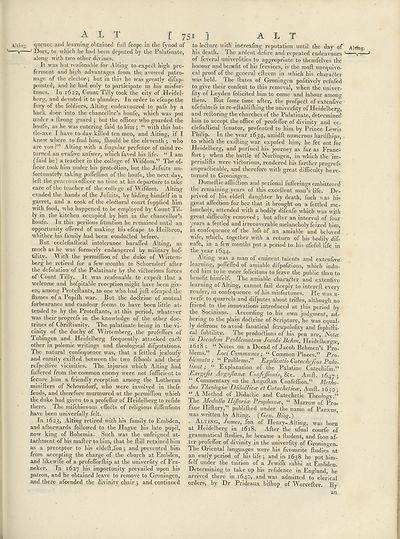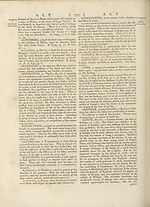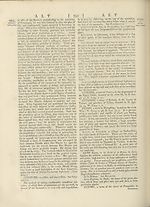Encyclopaedia Britannica, or, a Dictionary of arts, sciences, and miscellaneous literature : enlarged and improved. Illustrated with nearly six hundred engravings > Volume 1, A-AME
(803) Page 751
Download files
Complete book:
Individual page:
Thumbnail gallery: Grid view | List view

A L T C 75i ] ALT
quence and learning obtained full fcope in the fynod of
J Dort, to which he had been deputed by the Palatinate,
along with two other divines.
It was but reafonable for Alting to expect high pre¬
ferment and high advantages from the avowed patro¬
nage of the elector; but in this he was greatly difap-
pointed, and he had only to participate in his misfor¬
tunes. In 1622, Count Tilly took the city of Heidel¬
berg, and devoted it to plunder. In order to efcape the
fury of the foldiers, Alting endeavoured to pals by a
back door into the chancellor’s houfe, which was put
under a Itrong guard ; but the officer who guarded the
houfe, as he was entering faid to him ; “ with this bat¬
tle-axe I have to-day killed ten men, and Alting, if I
knew where to find him, fliould be the eleventh ; who
are you ?” Alting with a lingular prefence of mind re¬
turned an evafive anfwer, which faved his life. “ I am
(faid he) a teacher in the college of Wifdom.” The of¬
ficer took him under his protedion, but the Jefuits un¬
fortunately taking poffeffion of the houfe, the next day,
left the generous officer no time at his departure to take
care of the teacher of the college of Wifdom. Alting
evaded the hands of the Jefuits, by hiding himfelf in a
garret, and a cook of the eledoral court fupplied him
with tood, who happened to be employed by Count Til¬
ly in the kitchen occupied by him in the chancellor’s
houle. In this perilous fituation he remained until an
opportunity offered of making his efcape to Heilbron,
whither his family had been eonduded before.
But ecclefiaftical intolerance haraffed Alting, as
much as he was formerly endangered by military hof-
tility. MS ith the permiffion of the duke of Wirtem-
berg he retired for a few months to Schorndorf after
the defolation of the Palatinate by the vidorious forces
of Count Tilly. It was reafonable to exped that a
welcome and hofpitable reception might have been giv¬
en, among Proteftants, to one who had juft efcaped the
flames of a Popiffi war. But the dodrine of mutual
forbearance and candour feems to have been little at¬
tended to by the Proteftants, at this period, whatever
was their progrefs in the knowledge of the other doc¬
trines of Chriftianity. The palatinate being in the vi¬
cinity of the duchy of Wirtemberg, the profeffors of
Tubingen and Heidelberg frequently attacked each
other in polemic writings and theological deputations.
The natural confequence was, that a fettled jealoufy
and enmity exifted between the two fchools and their
refpedive vicinities. The injuries which Alting had
fuffered from the common enemy were not fufficient to
fee ore him a friendly reception among the Lutheran
minifters of Schorndorf, who were involved in thefe
feuds, and therefore murmured at the permiffion which
the duke had given to a profeffor of Heidelberg to refide
there. The mifehievous effects of religious diffenfions
have been univerfally felt.
In 1623, Aiting retired with his family to Embden,
and afterwTards followed to the Hague his late pupil,
now king of Bohemia. Such was the unfeigned at¬
tachment of his mafter to him, that he ftill retained him
as a preceptor to his eldeftJon; and prevented him
from accepting the charge of the church at Embden,
and likewife of a profefforfhip at the univerfity ef Fra-
neker. In 1627 his importunity prevailed upon his
patron, and he obtained leave to remove to Groningen,
and there afeended the divinity chair j and continued
to lecture with increafing reputation until the day of Airing,
his death. I he ardent defire and repeated endeavours 1 *" i/*"-"
of feveral univerfities to appropriate to themfelves the
honour and benefit of his fervices, is the moft unequivo¬
cal proof of the general efteem in which his character
was held. 1 he ftates of Groningen pofitively refuted
to give their confent to this removal, when the univer¬
fity of Leyden lolicited him to come and labour among
them. But fome time after, the profpedt of extenfive
ufefulnefs in re-eftabliffiing the univerfity of Heidelberg,
and reitoring the churches of the Palatinate, determined
him to accept the office of profeflor of divinity and ec¬
clefiaftical fenator, prefented to him by Prince Lewis
Philip. In the year 1634, amidft numerous hardfhips,
to which the exifling war expofed him, he fet out for
Heidelberg, and purfued his journey as far as Franc-
fort ; when the battle of Norlingen, in which the im-
perialifts were victorious, rendered his farther progrefs
impracticable, and therefore with great difficulty he re¬
turned to Groningen.
Domeftic affliction and perfonal fufferings embittered
the remaining years of this excellent man’s life. De¬
prived of his eldeft daughter by death, fuch v as his
great afleCtion for her that it brought on a fettled me¬
lancholy, attended with a bodily difeafe which was with
great difficulty removed; but after an interval of four
years a fettled and irrecoverable melancholy feized him,
in confequence of the lofs of an amiable and beloved
wife, which, together with a return of his bodily dif¬
eafe, in a few months put a period to his ufeful life in
the year 1644.
Alting was a man of eminent talents and extenfive
learning, poffeffed of amiable difpofitions, which indu¬
ced him to be more felicitous to ferve the public than to
benefit himfelf. The amiable character and extenfive
led ning ol Alting, cannot fail deeply to intereft every
reader, in confequence of his misfortunes. He was a-
verfe to quarrels and difputes about trifles, although no
friend to the innovations introduced at this period by
the Socinians. According to Ins own judgment, ad¬
hering to the plain dodrine of Scripture, he "was equal¬
ly defirous to avoid fanatical fcrupulofity and fophifti-
cal fubtility. The productions of his pen are, Notcc
hi Decadent Problcmatmn Jacobi Behm, Heidelbcrgay
1618 ; “ Notes on a Decad of Jacob Behmen’s Pro¬
blems.” JjOci Communes / 44 Common Places.” Pro-
biemata ; “ Problems.” Explicatio Catache/eos Pala-
tmat; “ Explanation of the Palatine Catechifm.”
Excgefis Augvjiance Confejioms, &c. Amft. 1647 j
“ Commentary on the Auguftan Confeffion.” Mctho-
dus Theologian Didapiece et Catacheticon, Amft. 1650;
“ A Method of DidaCtic and Catechetic Theology.”
The Medulla Hijlorian Prophance, “ Marrow of Pro¬
fane Hiftory,” publiffied under the name of Parseus,
was written by Alting. {Gen. Biog.)
Alting, Janies^ Ion of Henry-Alting, was born
at Heidelberg in 1618. After the ufual courfe of
grammatical ftudies, he became a ftudent, and foon af¬
ter profeffor of divinity in the univerfity of Groningen.
The Oriental languages were his favourite ftudies at
an early period of his life j and in 1638 he put him¬
felf under the tuition of a Jewifti rabbi at Embden.
Determining to take up his refidence in England, he
arrived there in 1640, and was admitted to clerical
order’s, by Dr Prideaux biffiop of Worcefter. By
an
quence and learning obtained full fcope in the fynod of
J Dort, to which he had been deputed by the Palatinate,
along with two other divines.
It was but reafonable for Alting to expect high pre¬
ferment and high advantages from the avowed patro¬
nage of the elector; but in this he was greatly difap-
pointed, and he had only to participate in his misfor¬
tunes. In 1622, Count Tilly took the city of Heidel¬
berg, and devoted it to plunder. In order to efcape the
fury of the foldiers, Alting endeavoured to pals by a
back door into the chancellor’s houfe, which was put
under a Itrong guard ; but the officer who guarded the
houfe, as he was entering faid to him ; “ with this bat¬
tle-axe I have to-day killed ten men, and Alting, if I
knew where to find him, fliould be the eleventh ; who
are you ?” Alting with a lingular prefence of mind re¬
turned an evafive anfwer, which faved his life. “ I am
(faid he) a teacher in the college of Wifdom.” The of¬
ficer took him under his protedion, but the Jefuits un¬
fortunately taking poffeffion of the houfe, the next day,
left the generous officer no time at his departure to take
care of the teacher of the college of Wifdom. Alting
evaded the hands of the Jefuits, by hiding himfelf in a
garret, and a cook of the eledoral court fupplied him
with tood, who happened to be employed by Count Til¬
ly in the kitchen occupied by him in the chancellor’s
houle. In this perilous fituation he remained until an
opportunity offered of making his efcape to Heilbron,
whither his family had been eonduded before.
But ecclefiaftical intolerance haraffed Alting, as
much as he was formerly endangered by military hof-
tility. MS ith the permiffion of the duke of Wirtem-
berg he retired for a few months to Schorndorf after
the defolation of the Palatinate by the vidorious forces
of Count Tilly. It was reafonable to exped that a
welcome and hofpitable reception might have been giv¬
en, among Proteftants, to one who had juft efcaped the
flames of a Popiffi war. But the dodrine of mutual
forbearance and candour feems to have been little at¬
tended to by the Proteftants, at this period, whatever
was their progrefs in the knowledge of the other doc¬
trines of Chriftianity. The palatinate being in the vi¬
cinity of the duchy of Wirtemberg, the profeffors of
Tubingen and Heidelberg frequently attacked each
other in polemic writings and theological deputations.
The natural confequence was, that a fettled jealoufy
and enmity exifted between the two fchools and their
refpedive vicinities. The injuries which Alting had
fuffered from the common enemy were not fufficient to
fee ore him a friendly reception among the Lutheran
minifters of Schorndorf, who were involved in thefe
feuds, and therefore murmured at the permiffion which
the duke had given to a profeffor of Heidelberg to refide
there. The mifehievous effects of religious diffenfions
have been univerfally felt.
In 1623, Aiting retired with his family to Embden,
and afterwTards followed to the Hague his late pupil,
now king of Bohemia. Such was the unfeigned at¬
tachment of his mafter to him, that he ftill retained him
as a preceptor to his eldeftJon; and prevented him
from accepting the charge of the church at Embden,
and likewife of a profefforfhip at the univerfity ef Fra-
neker. In 1627 his importunity prevailed upon his
patron, and he obtained leave to remove to Groningen,
and there afeended the divinity chair j and continued
to lecture with increafing reputation until the day of Airing,
his death. I he ardent defire and repeated endeavours 1 *" i/*"-"
of feveral univerfities to appropriate to themfelves the
honour and benefit of his fervices, is the moft unequivo¬
cal proof of the general efteem in which his character
was held. 1 he ftates of Groningen pofitively refuted
to give their confent to this removal, when the univer¬
fity of Leyden lolicited him to come and labour among
them. But fome time after, the profpedt of extenfive
ufefulnefs in re-eftabliffiing the univerfity of Heidelberg,
and reitoring the churches of the Palatinate, determined
him to accept the office of profeflor of divinity and ec¬
clefiaftical fenator, prefented to him by Prince Lewis
Philip. In the year 1634, amidft numerous hardfhips,
to which the exifling war expofed him, he fet out for
Heidelberg, and purfued his journey as far as Franc-
fort ; when the battle of Norlingen, in which the im-
perialifts were victorious, rendered his farther progrefs
impracticable, and therefore with great difficulty he re¬
turned to Groningen.
Domeftic affliction and perfonal fufferings embittered
the remaining years of this excellent man’s life. De¬
prived of his eldeft daughter by death, fuch v as his
great afleCtion for her that it brought on a fettled me¬
lancholy, attended with a bodily difeafe which was with
great difficulty removed; but after an interval of four
years a fettled and irrecoverable melancholy feized him,
in confequence of the lofs of an amiable and beloved
wife, which, together with a return of his bodily dif¬
eafe, in a few months put a period to his ufeful life in
the year 1644.
Alting was a man of eminent talents and extenfive
learning, poffeffed of amiable difpofitions, which indu¬
ced him to be more felicitous to ferve the public than to
benefit himfelf. The amiable character and extenfive
led ning ol Alting, cannot fail deeply to intereft every
reader, in confequence of his misfortunes. He was a-
verfe to quarrels and difputes about trifles, although no
friend to the innovations introduced at this period by
the Socinians. According to Ins own judgment, ad¬
hering to the plain dodrine of Scripture, he "was equal¬
ly defirous to avoid fanatical fcrupulofity and fophifti-
cal fubtility. The productions of his pen are, Notcc
hi Decadent Problcmatmn Jacobi Behm, Heidelbcrgay
1618 ; “ Notes on a Decad of Jacob Behmen’s Pro¬
blems.” JjOci Communes / 44 Common Places.” Pro-
biemata ; “ Problems.” Explicatio Catache/eos Pala-
tmat; “ Explanation of the Palatine Catechifm.”
Excgefis Augvjiance Confejioms, &c. Amft. 1647 j
“ Commentary on the Auguftan Confeffion.” Mctho-
dus Theologian Didapiece et Catacheticon, Amft. 1650;
“ A Method of DidaCtic and Catechetic Theology.”
The Medulla Hijlorian Prophance, “ Marrow of Pro¬
fane Hiftory,” publiffied under the name of Parseus,
was written by Alting. {Gen. Biog.)
Alting, Janies^ Ion of Henry-Alting, was born
at Heidelberg in 1618. After the ufual courfe of
grammatical ftudies, he became a ftudent, and foon af¬
ter profeffor of divinity in the univerfity of Groningen.
The Oriental languages were his favourite ftudies at
an early period of his life j and in 1638 he put him¬
felf under the tuition of a Jewifti rabbi at Embden.
Determining to take up his refidence in England, he
arrived there in 1640, and was admitted to clerical
order’s, by Dr Prideaux biffiop of Worcefter. By
an
Set display mode to:
![]() Universal Viewer |
Universal Viewer | ![]() Mirador |
Large image | Transcription
Mirador |
Large image | Transcription
Images and transcriptions on this page, including medium image downloads, may be used under the Creative Commons Attribution 4.0 International Licence unless otherwise stated. ![]()
| Permanent URL | https://digital.nls.uk/193142424 |
|---|
| Attribution and copyright: |
|
|---|
| Description | Ten editions of 'Encyclopaedia Britannica', issued from 1768-1903, in 231 volumes. Originally issued in 100 weekly parts (3 volumes) between 1768 and 1771 by publishers: Colin Macfarquhar and Andrew Bell (Edinburgh); editor: William Smellie: engraver: Andrew Bell. Expanded editions in the 19th century featured more volumes and contributions from leading experts in their fields. Managed and published in Edinburgh up to the 9th edition (25 volumes, from 1875-1889); the 10th edition (1902-1903) re-issued the 9th edition, with 11 supplementary volumes. |
|---|---|
| Additional NLS resources: |
|

